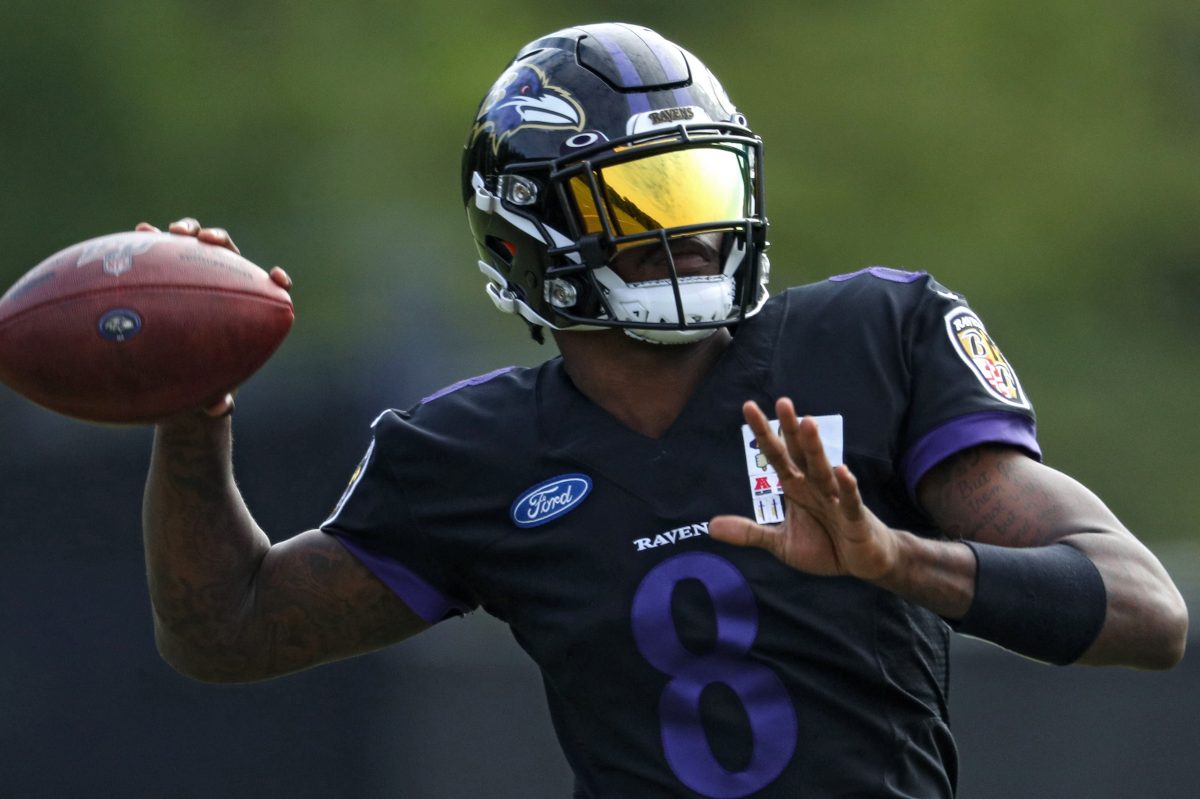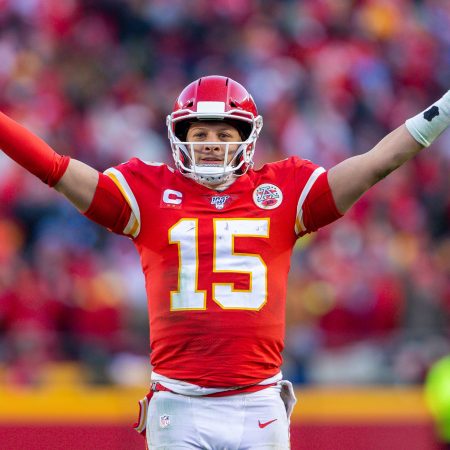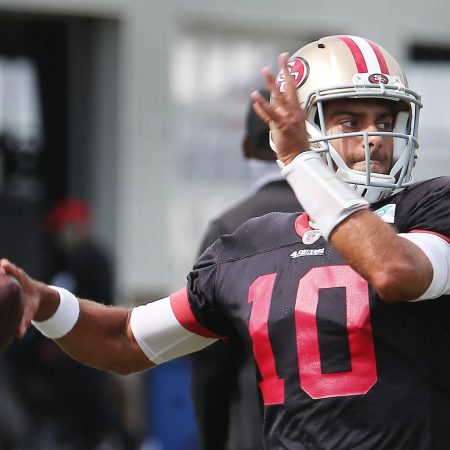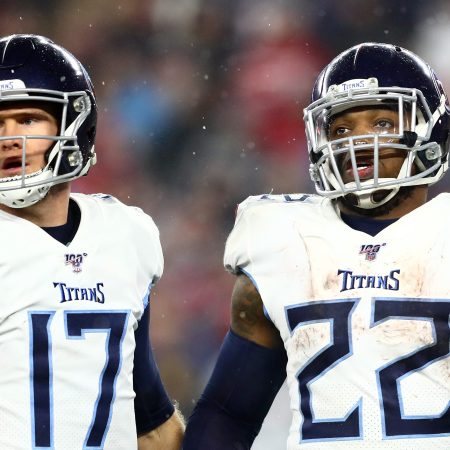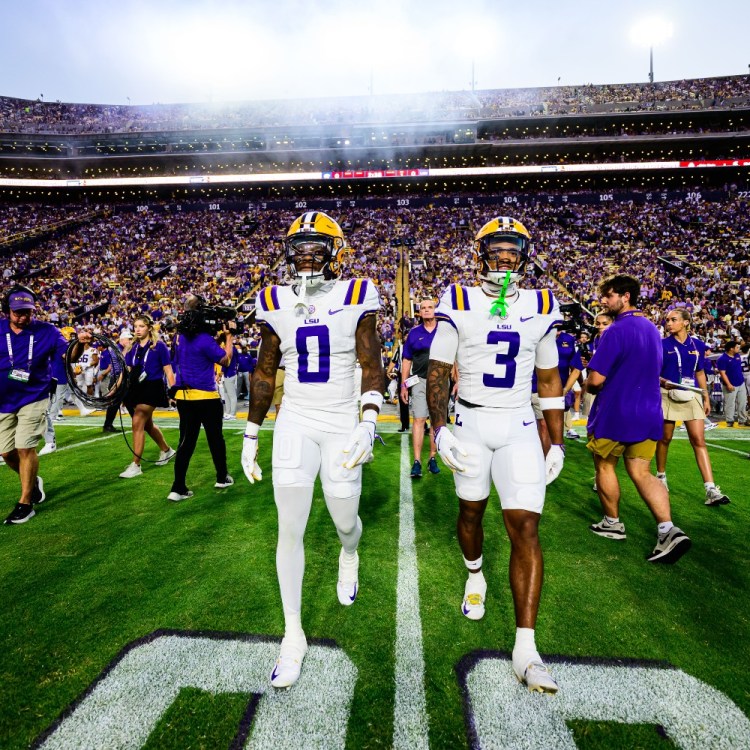Over the next six weeks, we’ll be preparing for the kickoff of the 2020 NFL season on September 10 by attempting to answer the most important question facing all 32 of the league’s franchises in order of their 2019 finish, from worst to first. Today’s team: the Ravens
No. 5: Baltimore Ravens
2019 Record: 14-2
Points For: 531 – Points Against: 282
Projected 2020 Over/Under Win Total: 11.5
In 22 regular-season starts spread out over his first two seasons in the NFL, Baltimore quarterback Lamar Jackson has completed nearly 64 percent of his passes while tossing nearly two touchdowns per game in addition to rushing for nearly 80 yards and an additional 0.5 TDs per game on the ground. Jackson, the reigning NFL MVP, has also averaged just 0.4 interceptions, 0.3 lost fumbles and 1.7 sacks in those 22 starts, going 19-3.
Both of the 23-year-old’s seasons in the NFL have been followed by playoff appearances, one against the Chargers and one against the Titans. In those starts, both losses, Jackson has completed just 51.4 percent of his passes while tossing an average of 1.5 touchdowns and 1.5 interceptions while rushing for nearly 100 yards with one fumble and zero rushing touchdowns, as well as taking 11 sacks over just two games.
Granted it is an extremely small sample size, but at this point, the data indicates that regular-season Jackson is very, very good, while playoff Jackson is very, very mediocre.
That being the case, Baltimore offensive coordinator Greg Roman said over the summer that Jackson needed to work on “everything” this offseason.
“Lamar is still relatively a young player. This will be his second year as a full-time starter, and I think, really, all aspects of his game he was able to really look into, with a critical eye, and really discuss certain things,” Roman said. “I think it’s been very valuable for him. So, I don’t know that it is just one thing. I think it’s been, really, everything. I think there [were] a lot of little things that he really became aware of as he was able to look at the body of work he’s put out so far. … I think, really, a lot of things, not one specifically.”
Now, entering Jackson’s third year in the NFL, it will be fascinating to see if the young QB did really go back to the drawing board in order to improve upon his stellar regular-season performance, or if he regresses back toward the playoff-level play that helped end Baltimore’s season in January.
For Jackson, who ended last season with a league-best 36 passing touchdowns, just six interceptions and an NFL single-season record 1,206 rushing yards by a quarterback (he averaged a whopping 6.9 yards per carry), a little bit of a step back seems almost guaranteed — and that’s probably fine and to be expected.
Last year was only the third time in the past 20 years that a quarterback who attempted at least 300 passes had a touchdown rate — the percentage of a quarterback’s attempts that go for a score — as high as Jackson’s from last season, at 9%. The first was Peyton Manning in 2004 and the second was Aaron Rodgers in 2011. Manning dropped from an absurd 9.9 percent to 6.2 the following year, and Rodgers went from 9 to 7.1.
As was the case with Manning and Rodgers, the drop in Jackson’s TD rate this season will probably be significant, which doesn’t mean he will be bad or even average, just not quite as dominant as he was. As a runner, Jackson may still have room to grow, but history says he will fall off as a passer.
Another reason that may happen is his lack of good targets. Baltimore’s passing game in 2019 was focused on tight end Mark Andrews, who posted a 64-852-10 receiving line last season. Marquise Brown, a 2019 first-round pick, served as a big-play threat for the Ravens, and had 584 yards and seven touchdowns on just 46 catches during his rookie year. Other than those two players, no one on the roster had 340 receiving yards or more.
The Ravens tried to address that by taking WR Devin Duvernay in the third round in 2020 after drafting WR Miles Boykin in the third round in 2019, but Baltimore’s pass-catching corps still seems pretty thin and will be in even rougher shape if injury or COVID-19 strikes. That concern is offset by Jackson’s rushing ability and backfield stud Mark Ingram still being on the roster, but if teams adjust to contain Baltimore’s heavy ground game and force the Ravens to throw it, that may not go as smoothly as it did last season.
Of course, it also may work out just fine, because as Roman showed last season, the Ravens are capable of altering their offense to keep defenses off-balance and assault them with looks they haven’t seen before. Roman will likely continue to exploit the threat Jackson presents as a runner to keep defenses honest and create better pass-blocking situations that should continue to open up throws downfield. If Jackson can continue to make those throws the way he did last season, the Ravens will be just fine. And even if he can’t and regresses a little, Baltimore’s offense should still be one of the league’s best
The question if whether that offense will sustain its efficacy in the playoffs — the one challenge that has seemed to foil Jackson thus far. In Baltimore, fans will be hoping that the third time’s a charm.
Whether you’re looking to get into shape, or just get out of a funk, The Charge has got you covered. Sign up for our new wellness newsletter today.
